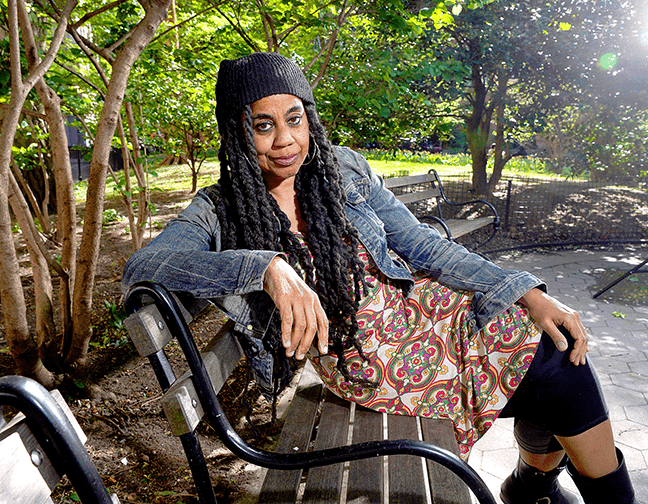‘Bridgerton,’ ‘Dickinson,’ ‘Good Lord Bird’: It’s all ‘truth,’ if not historic fact
- Share via
In “The Good Lord Bird,” audiences may have learned something surprising about Frederick Douglass: namely that he apparently cohabitates with two women at the same time. Now, “Bird,” which tells the story of Harpers Ferry revolutionary John Brown through the eyes of a young Black man called Onion, does not purport to be a documentary. But can that actually be true?
“Frederick Douglass was a lot of fun,” says Mark Richard, who produced and co-adapted (with star Ethan Hawke) the novel by James McBride. “Did he have two women under his roof at one time? Probably not. But he was a little bit of a ladies’ man, and we had fun making fun — and maybe Onion is misremembering. Like it says on the chyron [ahead of each episode], ‘All of this is true. Most of it happened.’ And that’s how we navigated the series.”
Historical dramas have taken their lumps over the years for a lack of accuracy in everything from costumes to technology to language to casting. But in a “truthiness” era, after four years of a government devoted to muddying the waters of what “facts” actually are, what’s interesting this Emmy season is how several TV series take the concept of truth, or facts, or accuracy — and consider it not concrete, but clay.
“Dickinson” may be the most historically accurate of the new batch: Creator Alena Smith bristles at the idea that her telling of Emily Dickinson’s life is anything but spot-on, down to the fact that the poet won a baking contest. “Facts are our structuring device,” she says. “But we are using the facts as borders within which to play with tone.”
To that end, facts or no, we get to see Dickinson’s inner life — her carriage ride with Death, her words composed in burning script in the air, her contemporary language — within the context of what actually happened. “It’s a poetic reinvention of Emily Dickinson’s spirit — but it is fully grounded in biographical detail,” she says.
The Envelope Showrunners Roundtable gathers the creators of ‘Bridgerton,’ ‘Dickinson,’ ‘Hacks,’ ‘The Handmaid’s Tale,’ ‘Genius: Aretha’ and ‘Small Axe’ to talk television today.
Meanwhile, Ronald Moore’s “For All Mankind” is a straight-up alternate history, in which the Soviet Union landed on the moon first, and sparked the U.S.’ competitive desire to stay in the space race. The American crews are diverse and set up a moon base. Mining begins. A war nearly starts. There are non-space ripple effects — John Lennon is not assassinated. In some ways, the history being told resembles the way Aaron Sorkin reinvented the presidency for “The West Wing.”
“That’s a fair comparison,” says Moore, a former “Star Trek: The Next Generation” writer who admits he also sees “Mankind” as a bridge to the future envisioned by Gene Roddenberry. “It is a fantasy of how we’d like things to work — but we want it realistic, too.”
But if loose concepts of facts and history have released writers from their corsets to tell new stories, it’s worth bearing in mind that no story about the past is really about that era: 1960s westerns were about the 1960s, really. “Happy Days” was about the 1970s, not the 1950s.
And with discussions of color-conscious casting and revisiting the elided role women and ethnic groups have had in history at the fore of current social awareness, all of these shows are really about that. Putting a Black woman in space in the 1960s (“Mankind”). Emily Dickinson’s love for her female best friend. The farcical absurdities woven into the tragedy of race relations (“Bird”).
Which makes “Bridgerton,” a show that rewrites Regency England (and is based on books by Julia Quinn) as one that includes Black and Asian characters as part of the aristocracy, part of the bigger conversation.
“What’s interesting is there’s so many different alternate views that are being proposed about this period of time,” says executive producer Betsy Beers. “There is a real hunger and curiosity — to a large degree because some of this may be true, but was brushed out of the history books. That is the point: Just because someone says something is ‘reimagined’ doesn’t mean it doesn’t exist.”
“The history handed to us was unacceptable,” says “Dickinson’s” Smith. “The question of ‘Did you get history right?’ implies that someone got it ‘right’ before. There’s no such thing. Power is in who frames the question. We are trying to ask ourselves what in the past is worth holding on to, a past that was abusive in many ways.”
And if viewers really need to know the history — or the various versions of history — they can go look it up for themselves, these shows are saying.
“People who are interested in this kind of stuff will bother to find out what’s true and what’s not,” says Moore. “That’s part of the fun of a show like this — it should make you go bother to find out, to learn some history. It’s an opportunity for that kind of moment to happen for an audience. To me, it helps the collective memory more than it confuses it.”
More to Read
Sign up for The Envelope
Get exclusive awards season news, in-depth interviews and columnist Glenn Whipp’s must-read analysis straight to your inbox.
You may occasionally receive promotional content from the Los Angeles Times.











